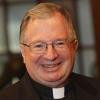"The existence of the State of Israel and its political options should be envisaged not in a perspective which is in itself religious, but in their reference to the common principles of international law." -- Commission for Religious Relations with the Jews, "Notes on the correct way to present Jews and Judaism in preaching and catechesis in the Roman Catholic Church," 1985
Eretz Yisrael is the Hebrew term for the Land of Israel. But no translation conveys the depth of historic attachment Jews possess for their ancient homeland, the mournful longing that invested the term during two millennia of exile, and the hope it represented with the rise of the Zionist movement in the 19th century. Regrettably, with the rise of the ultranationalist parties during the last half-century, it became a political slogan justifying Israeli expansion over "Greater Israel," including all the West Bank.
On its face, the legal-sounding formula from the Holy See's 1985 notes, which excludes "the State of Israel and its political options" from Catholics' religious relations with the Jews, fails to take into account the central place Israel plays in contemporary Jewish identity and how it necessarily affects Catholic-Jewish relations. So intimate and intense is the attachment of Jews to the state of Israel that the official Catholic position, as justified as it is, may feel to some like a quick hit of the brakes in the positive development of Catholic-Jewish relations.
After refraining from diplomatic recognition of Israel for 45 years on the grounds that Israel's final borders had not been set, the Holy See undertook a formal exchange of ambassadors with Israel in 1994 in what proved the mistaken expectation that the 1993 Oslo Accords had resolved the Israeli-Palestinian conflict.
Over the last 20 years, expectations of a stable state with settled borders have become harder and harder to sustain. With the years, as Israeli settlements spread across the West Bank and the Israeli government seized more and more Palestinian land for security reasons, the opportunity for a two-state solution has been thoroughly undercut.
Looking backward, the 1985 Vatican caution that "the existence of the State of Israel and its political options should be envisaged not in a perspective which is in itself religious" seems prescient. What remains in the religious ambit are the Jewish roots of Christianity, the rejection of any form of anti-Semitism, shared Jewish-Catholic social action, and the hope of eschatological reconciliation between our two communities.
Still, despite a quarter-century of advocacy for the church on Israel-related issues, I nonetheless find myself uneasy with a bifurcated consciousness: a religious consciousness of Catholic bonds with Judaism and critical awareness of Israel's political options. As necessary as moral discrimination about Israeli policy may be, I am uneasy over its potential chilling effect on religious respect for Jews.
Authenticity in the Catholic-Jewish relationship, of course, demands that we not allow ourselves to be indoctrinated or silenced by ultra-Zionist propaganda. Increasingly Israeli positions are articulated in an overstated way that denies credence to any alternative position. That denial takes a vigorous, programmatic shape with cadres of propagandists who attack both Jewish and Gentile critics of Israel with equal ferocity. Moral and intellectual integrity, however, demand we Catholics preserve a critical perspective on the Israeli state and its political options.
The Catholic intellectual tradition, moreover, invites us to hold our ties to Judaism in a universalistic perspective. We treasure our religious ties, we reject all forms of discrimination and anti-Semitism, but our Catholic outlook is universalistic, not ethnocentric. Our unique religious affinities should not seduce us to bow to the extremes of ethnocentric politics. Our love of Jews must share in our love of humanity.
I think of the universalistic vision of Psalm 87: "All call Zion mother/since all were born in her." "All" were the neighboring pagan nations: Egypt and Babylon, Philistia, Tyre and Ethiopia. Similarly, the Book of Isaiah (59), promising to bring devout foreigners to God's holy mountain, admonishes, "Have a care for justice, act with integrity."
It is within this Isaian vision that we may find reconciliation between our religious affection for Jews and our universalistic desire for a just peace. In that, we are very close to conscientious American Jews, like Henry Siegman, Peter Beinart, Mark Braverman, Marc Ellis and Michael Lerner. They maintain adherence to the prophetic heritage as central to their Jewish identity and as the basis of their criticism of Israeli policy. Love of the Jewish people and love of all God's people must be at one.
[Jesuit Fr. Drew Christiansen is former editor of America magazine and a professor of ethics at Georgetown University. He is a 23-year veteran of Jewish-Catholic dialogue.]




